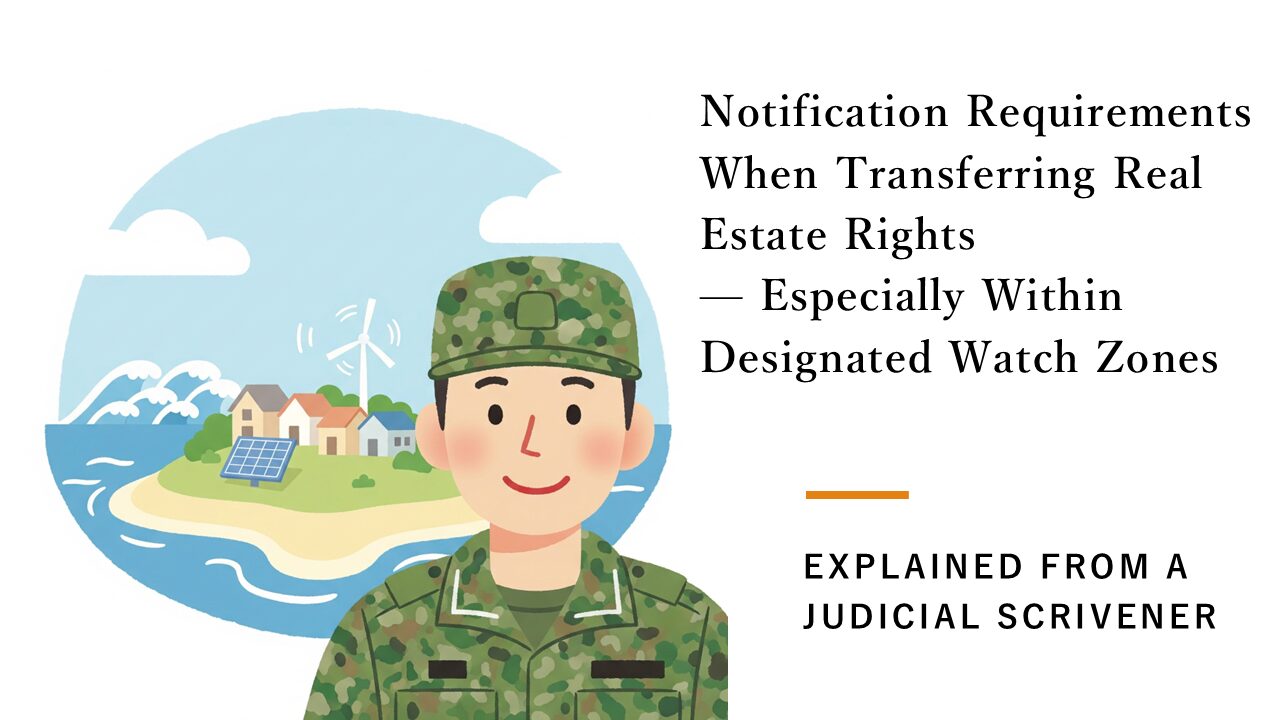When transferring property rights through real estate transactions, such as sales, it may be necessary to submit notifications or obtain permits from administrative authorities, depending on the case.
A typical example is the sale of agricultural land. In recent years, legal systems related to real estate have become increasingly complex due to the enactment and amendment of various laws. Failure to comply with notification or permit requirements may result in penalties or, in some cases, render the transaction invalid. Therefore, accurately understanding the relevant legal frameworks and providing sound advice is one of the critical roles of judicial scriveners.
In this article, we will explain from a judicial scrivener’s perspective the notification system required when transferring ownership rights of land or buildings located within “Special Watch Zones,” as stipulated by the Act on the Review and Regulation of the Use of Real Estate Surrounding Important Facilities and on Remote Territorial Islands (commonly referred to as the Important Land, etc. Regulation Act), which came into effect on September 20, 2022.
What Is the Important Land, etc. Regulation Act?
The Act on the Review and Regulation of the Use of Real Estate Surrounding Important Facilities and on Remote Territorial Islands (commonly known as the “Important Land, etc. Regulation Act”) was enacted on September 20, 2022. The law provides for surveys, regulations, and notification requirements concerning the use of land within areas surrounding important facilities or within remote territorial islands.
The “important facilities” defined under this law include:
- Facilities of the Self-Defense Forces and U.S. military bases in Japan
- Facilities of the Japan Coast Guard
- Infrastructure such as nuclear-related facilities and airports, as designated by Cabinet Order
Under this law, the Prime Minister is authorized to conduct investigations and issue recommendations or orders regarding land within such designated areas.
Notification Obligation for the Transfer of Real Estate in Special Watch Zones
Among the important facilities and remote islands mentioned above, the Prime Minister may designate certain areas as “Special Watch Zones” if they are deemed particularly sensitive (Article 12, Paragraph 1 of the Act).
A list of areas currently designated as Special Watch Zones is available on the Cabinet Office’s website:
Cabinet Office – Special Watch Zones List (Japanese)
If a contract is entered into for the transfer or establishment of ownership or equivalent rights of land or buildings within such a Special Watch Zone—and the property in question meets or exceeds a specified area—both parties (seller and buyer) must submit a notification to the Prime Minister (Article 13, Paragraphs 1 & 3 of the Act).
Specifically, notification is required if the property is within a Special Watch Zone and is 200 square meters or larger (Article 13, Paragraph 1; Cabinet Order Article 4).
The notification must include the following information:
- Name and address of each party (for corporations, also include representative’s name)
- Location and area of the land/building
- Type and content of the rights being transferred or established
- Intended use of the land or building
- Nationality of the transferee or acquirer (for corporations, indicate if the representative is not a Japanese national)
- Current status of use of the land or building
- Scheduled date of the contract (or actual date, if notifying after execution)
This notification must be submitted in advance—before signing the contract.
Penalties for Non-Compliance
Failure to file the required notification may result in up to six months of imprisonment or a fine of up to one million yen (Article 26), under any of the following circumstances:
- A contract is executed without prior notification (Article 13, Paragraph 1)
- Notification is not submitted within two weeks after contract execution (Article 13, Paragraph 3)
- False information is included in the notification (Article 13, Paragraphs 1 or 3)
Furthermore, depending on the intended use of the land, the Prime Minister may issue recommendations or orders requiring the user to refrain from certain actions or take necessary corrective measures (Article 9).
Exemptions from Notification Requirements
The following types of transfers are not subject to notification:
- Inheritance, division of estate, mergers, final judgments, and other transfers not based on contractual agreements (such as the exercise of options or redemption rights)
Additionally, the following contracts are exempt from the notification obligation (Article 13, Paragraph 1; Cabinet Order Article 6; Ministerial Ordinance Article 6):
- Contracts that require permission under Article 27(1) of the Public Waters Reclamation Act
- Contracts related to projects authorized under Article 26(1) of the Land Expropriation Act
- Contracts that require permission under Article 3(1) of the Agricultural Land Act
These contracts are subject to prior administrative screening under their respective laws and therefore do not require separate notification under the Important Land, etc. Regulation Act.
Furthermore, in the following cases, post-contract notification within two weeks is permitted instead of prior notification (Article 13, Paragraphs 2 & 3; Cabinet Order Article 7):
- Civil mediation under the Civil Conciliation Act
- Settlements under the Code of Civil Procedure
- Mediation under the Domestic Relations Case Procedure Act
- Acquisitions through delinquency dispositions, compulsory execution, or foreclosure (including analogous auctions)
Advice from a Judicial Scrivener
This law was introduced from a national security perspective and imposes serious obligations, including potential criminal penalties. However, given that it is relatively new, awareness on the ground remains limited.
For judicial scriveners and real estate professionals, it is crucial to verify in advance whether the subject property falls within a Special Watch Zone.
This is particularly relevant for areas near Japan Ground Self-Defense Force bases, many of which are located in suburban areas experiencing development. Special caution is required when dealing with transactions involving land for solar power generation, which are often located in such zones.
Our office offers support with preparing notifications and liaising with the relevant administrative authorities. If you are considering a transaction involving property in a Special Watch Zone, please feel free to contact us for assistance.




コメント